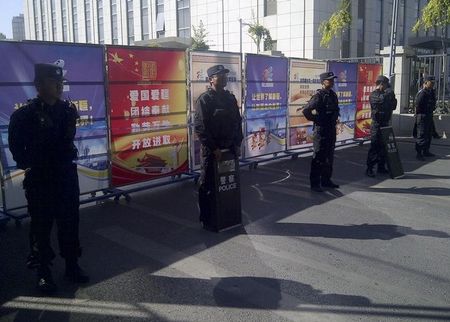BEIJING (Reuters) - China's trial of a Uighur scholar on separatism charges completed its two days of evidence on Thursday, and his lawyer said a verdict in a case that has drawn international criticism might come next week.
Prosecutors in China's western Xinjiang region said economics professor Ilham Tohti had promoted the idea of independence for the region on a website he managed called Uighurbiz.net. Tohti has in the past spoken out for the rights of Xinjiang's indigenous Muslim Uighur ethnic group.
The charge carries a maximum penalty of death in extreme cases, though Tohti's lawyers say he will probably faces a lengthy prison sentence.
The United States, the European Union and human rights groups have called for Tohti's release after a nine-month detention widely seen as part of a government crackdown on dissent in Xinjiang, where tension between Uighurs and majority Han Chinese has led to violence.
Tohti's lawyer Li Fangping said on Wednesday that Tohti rejected evidence presented against him and statements by his students calling him a separatist had been made under pressure from authorities.
Tohti on Thursday was able to speak in his defence, Li said, telling the court that he established the website to promote dialogue between Uighur and Han scholars and that he had publicly opposed separatism and violence.
"They heard him, but whether they will consider it is hard to know," Li told Reuters by telephone from Xinjiang's capital Urumqi where the trial was held.
"It's difficult to say what the upcoming verdict will be. But the prosecutors were comparatively harsh, and they called for a more serious verdict," Li said.
"If it is quick, it [a verdict] will come next week," Li said.
China's ruling Communist Party tightly controls courts and guilty verdicts in such cases are typically a foregone conclusion.
Beijing blames a series of violent attacks in which hundreds have died on Islamist militants who it says want to establish an independent state in Xinjiang called East Turkestan.
Activists say the government's repressive policies, including controls on Islam, have provoked unrest.
Tohti, who taught at Beijing's Minzu University, which specialises in ethnic minority studies, has said he never associated with any terrorist organisation or foreign-based group and has "relied only on pen and paper to diplomatically request" human rights and legal rights for Uighurs.
Separately, a court in the southwestern province of Yunnan sentenced four people to between 10 and 20 years in jail for "plotting terror attacks", state media said.
The four were influenced by religious extremism and made explosives in Beijing and Yunnan in attempting to launch a "jihad", the Xinhua news agency said late on Wednesday.
All four defendants, whose names appear to be Uighur, appealed against the rulings, it said.
The decision follows last week's sentencing of three people to death and one to life in prison for a March attack at Kunming train station in Yunnan in which 31 people died and 141 were injured.

Shen Deyong, the executive vice president of China's Supreme People's Court, urged judges to "speed up trials of terror cases and deliver exemplary penalties", Xinhua reported last week.
(Reporting by Michael Martina and Joseph Campbell; Editing by Andrew Roche)
